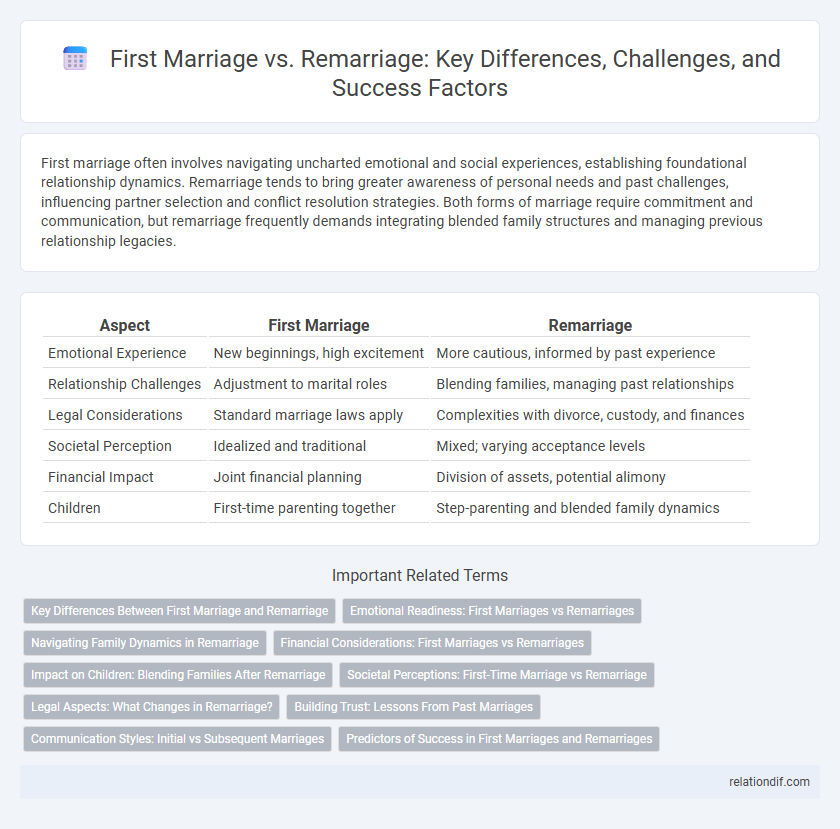First marriage often involves navigating uncharted emotional and social experiences, establishing foundational relationship dynamics. Remarriage tends to bring greater awareness of personal needs and past challenges, influencing partner selection and conflict resolution strategies. Both forms of marriage require commitment and communication, but remarriage frequently demands integrating blended family structures and managing previous relationship legacies.
Table of Comparison
| Aspect | First Marriage | Remarriage |
|---|---|---|
| Emotional Experience | New beginnings, high excitement | More cautious, informed by past experience |
| Relationship Challenges | Adjustment to marital roles | Blending families, managing past relationships |
| Legal Considerations | Standard marriage laws apply | Complexities with divorce, custody, and finances |
| Societal Perception | Idealized and traditional | Mixed; varying acceptance levels |
| Financial Impact | Joint financial planning | Division of assets, potential alimony |
| Children | First-time parenting together | Step-parenting and blended family dynamics |
Key Differences Between First Marriage and Remarriage
First marriage often involves navigating the unknowns of partnership, while remarriage typically benefits from previous relational experience and clearer expectations. Financial complexities and blended family dynamics are more common in remarriages, impacting legal and emotional considerations. Commitment challenges differ as first marriages may prioritize building trust from scratch, whereas remarriages focus on healing past wounds and establishing new boundaries.
Emotional Readiness: First Marriages vs Remarriages
Emotional readiness in first marriages often involves navigating new relational dynamics and personal growth, while remarriages require managing past emotional baggage and blended family complexities. Studies reveal that individuals entering remarriage benefit from greater self-awareness and conflict resolution skills developed through previous marital experiences. Effective emotional preparation significantly increases the likelihood of relationship satisfaction and long-term stability in both first and subsequent marriages.
Navigating Family Dynamics in Remarriage
Remarriage presents complex family dynamics that often require careful navigation to foster harmony among stepchildren, biological parents, and extended family members. Effective communication, establishing clear boundaries, and showing empathy toward all family members' emotions are crucial in blending families successfully. Understanding the unique challenges of remarriage helps build trust and create cohesive, supportive family environments.
Financial Considerations: First Marriages vs Remarriages
Financial considerations differ significantly between first marriages and remarriages, with remarriages often involving complex asset blending, inheritance rights, and alimony obligations from previous relationships. Couples in their first marriage typically face financial planning centered on joint savings, debt management, and building shared investments, while those in remarriages must account for prenuptial agreements and financial responsibilities to stepchildren. Understanding these distinctions is crucial for navigating tax implications, estate planning, and long-term financial security in both scenarios.
Impact on Children: Blending Families After Remarriage
Children often face unique emotional and social challenges during remarriage, including adapting to new parental roles and sibling dynamics. Research shows that effective communication and establishing consistent boundaries support smoother transitions in blended families. Long-term positive outcomes correlate with parental cooperation and the stability of the stepfamily environment.
Societal Perceptions: First-Time Marriage vs Remarriage
First-time marriages are often perceived as traditional and idealized, symbolizing new beginnings and social conformity, whereas remarriages may face societal biases linked to prior relationship failures or blended family complexities. Cultural norms and religious beliefs heavily influence the acceptance and expectations of remarried individuals, with some communities attributing negative stigma or reduced legitimacy to unions beyond the first. Despite evolving attitudes, remarriage still encounters challenges in social integration, impacting how individuals navigate identity and social roles within their families and communities.
Legal Aspects: What Changes in Remarriage?
Remarriage involves distinct legal considerations compared to a first marriage, notably the need to resolve issues related to prior divorce decrees, property division, and child custody arrangements. Estate planning and inheritance laws often require updates to reflect new marital status and blended family dynamics. Alimony obligations and eligibility for spousal benefits may also change, impacting financial rights and responsibilities in remarriage.
Building Trust: Lessons From Past Marriages
First marriages often face the challenge of establishing trust from a fresh start, while remarriages benefit from lessons learned in previous relationships, allowing partners to recognize and address past trust issues more effectively. Individuals entering remarriage typically show heightened awareness of communication patterns and emotional boundaries, which contributes to stronger trust-building efforts. Emphasizing transparency, consistency, and vulnerability in both first marriages and remarriages fosters a deeper sense of security and intimacy between spouses.
Communication Styles: Initial vs Subsequent Marriages
Communication styles in first marriages often involve more exploratory dialogue as partners navigate uncharted emotional territories. In subsequent marriages, couples tend to adopt more direct and experienced communication approaches, drawing on lessons learned from prior relationships. These evolved communication patterns can contribute to quicker conflict resolution and enhanced emotional understanding.
Predictors of Success in First Marriages and Remarriages
Research identifies communication quality, conflict resolution skills, and emotional support as key predictors of success in both first marriages and remarriages. Financial stability and shared values significantly contribute to marital satisfaction, with remarriages often facing unique challenges such as blending families or previous relationship baggage. Studies show that while first marriages benefit from higher optimism levels, remarriages require stronger adaptability and commitment to overcome past experiences.
First Marriage vs Remarriage Infographic

 relationdif.com
relationdif.com